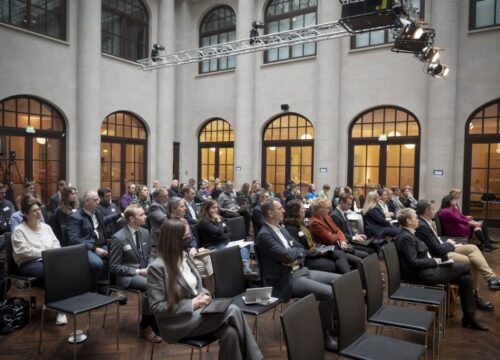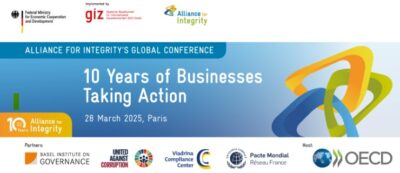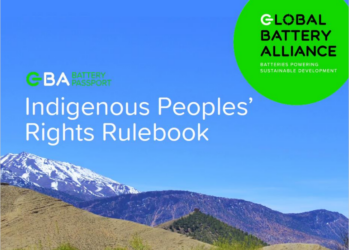The conference was opened by a speech by the Parliamentary State Secretary of the German Federal Ministry for Economic Cooperation and Development (BMZ), Dr. Bärbel Kofler. In her address, she touched upon the lack of progress in implementing the 2030 Agenda and emphasized the central role that MSPs can play in accelerating implementation.

Three short interviews on MSPs
Subsequently, the voices of various stakeholder groups were introduced in three short interviews. Dr. Torsten Freund, Global Battery Alliance (GBA), explained the relevance of MSPs for the energy transition. Determined and joint action by politics, industry and civil society is urgently needed for this. Dr. Gisela Burckhardt, Chairwoman of the Board of the feminist organization FEMNET e.V., provided insights into the diverse areas of activity of the association for women’s rights. In addition to carrying out targeted projects abroad and educational work, she sees involvement in partnerships and networks as a central aspect. The third interviewee to speak was Ola Goransson, Sustainable Development Officer of the Outreach and Partnerships Division of the United Nations, Department of Economic and Social Affairs (DESA). Although the level of implementation of the SDGs is not yet as advanced, he noted that partnerships create powerful levers that are needed to drive development. In this regard, partnership platforms that systematically bring together the private sector, governments, the UN system and civil society have proven to be the most effective way forward at the national level.

Working in small groups
In four small groups on different focus topics, participants then had the opportunity to delve deeper into individual aspects of MSPs in the context of the 2030 Agenda.
In the group “What contributions can MSPs make to the implementation of the 2030 Agenda?”, the first topic was the current insufficient implementation status of the SDGs. Afterwards, relevant aspects of MSP’s contributions to the implementation of the SDGs were discussed. The exchange highlighted, among other things, the inclusion of all relevant actors, the selection of suitable topics and goals, the resources available, support from the highest hierarchical levels of the participating organizations, and equal cooperation.
In the group “How do we work together? Opportunities and challenges of heterogeneous groups of actors”, subgroups discussed the aspects “Local actors in MSPs”, “Equality in MSPs” and “Processes in MSPs”. As part of this, the relationship level between people was emphasized as elementary and the importance of trust was stressed. In addition, the topics of power and power imbalances were discussed.
In the group “How successful are we together? Impact of MSPs”, there was agreement that MSPs have an impact at different levels and on different target groups. Like this, the instrument MSP usually strengthens transparency, trust, expertise and joint learning between and among the individual actors of an MSP (internal impact). However, an MSP should above all also have an impact in the partner country and on the target groups (external impact). A concrete external impact of MSPs should in many cases still be strengthened or scaled. The internal impact, on the other hand, often lacks the integration of meaningful indicators. In addition, the participants emphasized the relevance of a common, comprehensive understanding of the impact of an MSP among its stakeholders, which can be supported by tools such as the impact narrative.
In the group “What’s next for MSPs? Duration and Sustainability of Partnerships”, experiences on legal forms, financing models and governance structures in partnerships were discussed. There was consensus that MSPs often operate without an “end date” and that the need for the partnership to continue depends on the actors’ objectives – the more comprehensive the level of ambition, the more long-term the cooperation. Another topic was the transition from state (co-)funding to the acquisition of funds independent of federal ministries. Various legal forms were explored for this purpose.

Looking to the future
During the second part of the conference, the participants lastly turned their focus to the future and asked themselves what more MSPs can do between now and 2030 to further promote the achievement of the ambitious goals of the global sustainability agenda. To begin, Sandra Retzer, Head of Department at GIZ, addressed the participants. Her contribution focused on factors for the long-term success of MAP, such as the joint development of clear goals, sustainable resourcing and constant monitoring. In addition, she mentioned that GIZ has recently committed to increased work in partnerships from planning to implementation of projects with its 2028 vision.
With this outlook, the fishbowl discussion began, in which participants could take turns sharing their opinions and experiences on various issues related to MSPs and the path to 2030. Among the topics discussed were the contributions MSPs can make in the context of the Act on Corporate Due Diligence Obligations for the Prevention of Human Rights Violations in Supply Chains (LkSG) and the structures, capabilities, and frameworks MSPs need to succeed. It became clear that the participation of rightsholders in an MSP, commitment and sustainable financing are highly relevant.
At the end of the conference, Mr. Jochen Steinhilber, Head of Department at BMZ, reflected on the aspects previously discussed and addressed how the BMZ will continue to support the MSP approach in the future. His “half-time address”, as he put it, summarized the current challenges in implementing the SDGs but also gave hope and confidence in the power of partnerships for the future.

The network conference was significantly enriched by the different and oftentimes interactive formats. The event benefited from the overall facilitation of Dr Minu Hemmati as well as the facilitation of the small groups by Julika Schmitz, Dr Marcus Andreas, Susanne Salz and Dr Minu Hemmati.
For a detailed report on the conference (in DE), click here.



